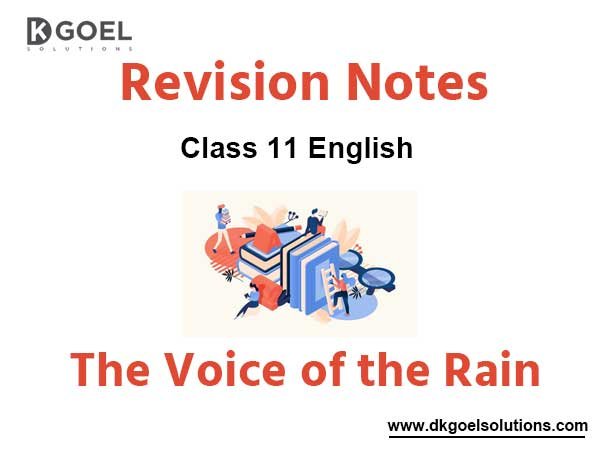Notes Poem 3 The Voice of the Rain
Class 11 commerce students can refer to Poem 3 The Voice of the Rain notes given below which is an important Poem in the class 11 English book. These notes and important questions and answers have been prepared based on the latest CBSE and NCERT syllabus and books issued for the current academic year. Our team of English teachers has prepared these notes for class 11 English for the benefit of students so that you can read these revision notes and understand each topic carefully.
The Voice of the Rain Notes Class 11 English
Refer to the notes and important questions given below for The Voice of the Rain which is really useful and has been recommended by Class 11 English teachers. Understanding the concepts in detail and then solving questions by yourself will help you to learn all topics given in your NCERT Books.
THEME:
The poem is written in the form of a conversation between the poet and the rain.
It describes the importance of rain which gives life to the earth and nurtures all living beings.
MAIN POINTS:
• The poets asks the rain “and who art thou?” and strangely the rain replies, calling itself the “poem of earth”.
• The rain says that it is born from the earth but it cannot be seen since it is in the form of vapours.
• It rises into the sky to form clouds and then falls back to the earth in the form of drops.
• It removes droughts and washes away even the tiniest particles. It falls on dry seeds which appear lifeless and helps them sprout into saplings.
• It gives life to its own origin i.e. earth; it purifies and beautifies the earth. Like song coming out from the heart, it spreads joy all around and seeps back into the earth.
POETIC DEVICES:
1. PERSONIFICATION: “said the voice of the rain” Rain speaks throughout the poem.
2. ANTITHESIS: “All together changed, and yet the same”- two opposite ideas have been pulled together to describe the continuous cycle of rain.
3. METAPHOR: “I am the poem of the earth”.
EXTRACTS :
(i) And who art thou? Said I to the soft
Falling shower
Which, stranger to tell, gave me an
Answer as here translated:
I am the poem of the earth, said the voice of the rain.
Question. Which poetic device has been used here?
Ans. Personification- the rain is speaking and giving answers like human beings.
Alliteration-”an answer as here…”
Question. Name the poem and the poet?
Ans. Walt Whitman
Question. Find a word/phrase from the extract which means “drizzle”.
Ans. “soft falling shower” means drizzle.
Question. Who is the speaker here? Who is he speaking to?
Ans. Walt Whitman, the poet is the speaker. He is speaking to the rain.
Question. Which image has been created in the first line?
Ans. The poet has created the image of a beautiful rainy day where the rain in falling down softly on the earth.
Question. What are the meanings of the words “art” and “thou”?
Ans. “Art” means are; “thou” means you.
Question. Explain the phrase “which strange to tell, gave me an answer”.
Ans.The poet is speaking to the rain. He is surprised when the rain gives a reply to his question.
Question. Why does that rain call itself so?
Ans. Just as a poem originates from the heart of the poet and gives joy to every listener or reader, similarly, the rain originates from the earth and gives happiness to every living being,
Question. Which poetic device is there in the phrase “I am the poem of earth”?
Ans. Metaphor.
Question. What does the rain call itself?
Ans. The rain calls itself the poem of the earth.
(ii) “I am the poem of the earth, said the voice of the rain,
Eternal I rise impalpable out of the land and the bottomless sea”.
Question. Find out words form the extract which mean the same as:
1. Ever-lasting
2. Which cannot be seen
Ans. 1. Eternal;
2. Impalpable
Question. Why does the rain call itself “impalpable”?
Ans. The water on the surface of the earth evaporates in the form of vapours and rises up in the sky. This is an ever-lasting process but cannot be seen by us.
Therefore, the rain calls itself “impalpable”.
Question. Who is the speaker in the above lines? Who is “I” speaking to?
Ans. The rain is the speaker here. It is speaking to the poet.
Question. Where does the rain rise up from?
Ans. The rain rises up from “the land and bottomless sea”.
(iii) Upward to heaven, whence, vaguely form’d, Altogether changed, and yet the same. I descend to lave the droughts, atomies, Dust layers of the globe, And all that in them without me were Seeds only, latent, unborn:
Question. Explain “altogether changed, and yet the same”.
Ans. Rain changes several forms still it remains the same. It rises from the earth in the form of vapours. It rises up to form clouds. Then it cools down and falls on the earth in the form of water droplets.
Question. What would happen to the seeds without rain?
Ans. The seeds would remain unborn without the rain.
Question. Explain the phrase “vaguely form’d”.
Ans. It means that the vapours rise up from the earth to form clouds of various shapes and sizes. Their shape is not definite.
Question. Which word in the extract means “inactive or untapped”?
Ans. Latent
Question. Explain the phrase “I descend to lave the droughts”
Ans. Rain falls on the earth and satisfies everyone’s thirst. It washes away famines.
Question. Whom does “I” refer to in the lines above?
Ans. “I” refers to the rain.
Question. Explain the last two lines.
Ans. Seeds appear to be dry and lifeless, yet, as rain falls on them they sprout into new plants.
Question. Which word in the extract means the same as “wash”?
Ans. Lave
(iv) And forever by day and night, I give back life to my Own origin, and make pure and beautify it; (For song, issuing from its birthplace, after Fulfilment, wandering. Reck’d or unreck’d duly with love returns).
Question. Who is “I” in the first line?
Ans. “I” is the rain.
Question. Is the comparison made by poet justified according to you?
Ans. Yes. Just as a song originates from the heart and gives joy to every listener. Similarly, rain originates form the earth and spreads happiness and contentment everywhere.
Question. What does “I” do to its own origin?
Ans. The rain gives back life to its origin. It makes pure and beautifies it.
Question. Explain the phrase “make pure and beautify”.
Ans. The earth washes away even the tiniest of the particles. It removes droughts and dust. Thus, it purifies and beautifies the earth.
Question. What has the rain been compared to?
Ans. The poet has compared rain with a song because he finds similarity in both.
Question. Where does “I” originate from?
Ans. The rain originates from the earth.


